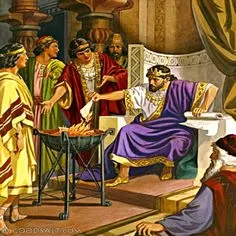List of Kings In the Bible In Order


In the Bible, a king is typically a male monarch who holds a position of authority and leadership over a kingdom or a group of people. Here is a list of some of the prominent kings mentioned in the Bible, their territory, and passages in the bible where their story was illustrated.
List of Kings In the Bible
- Saul – The first king of Israel (1 Samuel)
- David – A shepherd who became a renowned king (2 Samuel)
- Solomon – Known for his wisdom and building the temple (1 Kings)
- Rehoboam – Son of Solomon, the kingdom divided under his reign (1 Kings)
- Jeroboam – King of the northern kingdom of Israel after the division (1 Kings)
- Asa – King of Judah known for religious reforms (1 Kings, 2 Chronicles)
- Jehoshaphat – Another reforming king of Judah (1 Kings, 2 Chronicles)
- Ahab – A notable king of Israel, associated with Elijah (1 Kings)
- Jehu – A king of Israel who carried out God’s judgment (2 Kings)
- Joash – King of Judah who repaired the temple (2 Kings)
- Uzziah (Azariah) – A prosperous king of Judah (2 Kings, 2 Chronicles)
- Hezekiah – A righteous king who sought God’s help (2 Kings, 2 Chronicles)
- Manasseh – A wicked king who later repented (2 Kings, 2 Chronicles)
- Josiah – A reforming king who rediscovered the Law (2 Kings, 2 Chronicles)
- Jehoiachin (Jeconiah) – King of Judah taken into exile (2 Kings)
- Nebuchadnezzar – King of Babylon during the exile (Daniel)
- Belshazzar – Last king of Babylon, during the fall (Daniel)
- Cyrus the Great – Persian king who allowed Jews to return (Ezra)
- Darius the Mede – Another Persian king in Daniel’s time (Daniel)
- Artaxerxes – Persian king who supported rebuilding Jerusalem (Ezra, Nehemiah)
- Alexander the Great – Conqueror who impacted the Jewish world (Historical context)
- Herod the Great – Ruler of Judea during Jesus’ birth (Matthew)
There are other kings and rulers mentioned in various parts of the Bible. The kings listed above are significant figures within the biblical narrative.
READ MORE: List of Intercessors In The Bible and Their
List of Kings In the Bible
Many more king names are mentioned in the Bible, especially when considering various genealogies, minor rulers, and other historical contexts. Here are a few more king names from the Bible:
- Omri – King of Israel (1 Kings)
- Jehoshaphat – King of Israel (1 Kings)
- Ahaziah – King of Israel (1 Kings, 2 Kings)
- Joram – King of Israel (1 Kings, 2 Kings)
- Jehoahaz – King of Israel (2 Kings)
- Jehoash – King of Israel (2 Kings)
- Jehoahaz – King of Judah (2 Kings)
- Jehoiakim – King of Judah (2 Kings, Jeremiah)
- Jehoiachin (Jeconiah) – King of Judah (2 Kings)
- Zedekiah – Last king of Judah (2 Kings, Jeremiah)
- Hoshea – Last king of Israel (2 Kings)
- Hiram – King of Tyre (1 Kings, 2 Chronicles)
- Baasha – King of Israel (1 Kings)
- Elah – King of Israel (1 Kings)
- Zimri – King of Israel (1 Kings)
- Tibni – Competing king of Israel (1 Kings)
- Menahem – King of Israel (2 Kings)
- Pekahiah – King of Israel (2 Kings)
- Pekah – King of Israel (2 Kings)
- Jehoiada – High priest and regent during Athaliah’s rule (2 Kings)
- Zechariah – King of Israel (2 Kings)
- Shallum – King of Israel (2 Kings)
- Merodach-Baladan – King of Babylon (Isaiah)
- Neco II – Pharaoh of Egypt (2 Kings, Jeremiah)
- Nebuchadnezzar II – King of Babylon (Daniel, Jeremiah)
- Evil-Merodach – King of Babylon (2 Kings, Jeremiah)
- Artaxerxes II – Persian king (Ezra, Nehemiah)
- Demetrius I – Seleucid ruler (1 Maccabees)
- Antiochus IV Epiphanes – Seleucid ruler (1 Maccabees)
- Alexander Jannaeus – Hasmonean king (Historical context)
- Aristobulus I – Hasmonean king (Historical context)
Here’s A List Of The Kings of Israel
- King Jeroboam
- King Nadab
- King Baasha
- King Elah
- King Zimri
- King Omri
- King Ahab
- King Ahaziah
- King Jehoram
- King Jehu
- King Jehoahaz
- King Joash
- King Jeroboam II
- King Zachariah
- King Shallum
- King Menaham
- King Pekahiah
- King Pekah
- King Hoshea
Lives of three prominent kings from the Bible
Here are summaries of the lives of three prominent kings from the Bible, including their reigns, achievements, and eventual downfalls:
1. King David


Reign: David reigned as the second king of Israel, around 1010 to 970 BCE.
Achievements: David is known for various accomplishments, including his defeat of the giant Goliath, his establishment of Jerusalem as the capital of Israel, and his successful military campaigns that expanded Israel’s territory. He was also a skilled musician and poet, composing many of the Psalms.
Downfall: Despite his many successes, David’s downfall came from a series of personal and moral failures. One of the most well-known incidents is his affair with Bathsheba and his subsequent arrangement of the death of her husband, Uriah. These actions led to a period of turmoil within his family, including rebellion and violence among his children.
2. King Solomon


Reign: Solomon succeeded David and reigned from around 970 to 931 BCE.
Achievements: Solomon is remembered for his wisdom, his construction of the First Temple in Jerusalem, and his widespread trade and prosperity. He is also known for his proverbial writings, many of which are collected in the biblical Book of Proverbs.
Downfall: Solomon’s later years saw a decline in his devotion to God. He accumulated vast wealth and engaged in political alliances through marriages to foreign wives, who introduced idolatry and other foreign practices. As a result, God became displeased, and after Solomon’s death, the kingdom of Israel faced division and strife.
3. King Hezekiah


Reign: Hezekiah ruled Judah from around 715 to 686 BCE.
Achievements: Hezekiah is praised for his religious reforms, which aimed to remove idolatry and restore the worship of the one true God. He also fortified Jerusalem and successfully defended the city against the Assyrian invasion during the reign of King Sennacherib.
Downfall: Hezekiah’s downfall is not as dramatic as some other kings, but he did face a period of illness and political challenges. His pride led him to show off his treasures to envoys from Babylon, which resulted in the prophet Isaiah predicting the Babylonian exile that would occur in the future.
These accounts highlight the complexity of the lives of these biblical kings, with their successes and achievements often accompanied by personal flaws or moral lapses. The Bible presents these stories as both historical narratives and moral lessons, showing the consequences of human actions and the importance of remaining faithful to God’s commands.
Who Is A King In The Bible?
In the Bible, a king is typically a male monarch who holds a position of authority and leadership over a kingdom or a group of people. The concept of kingship is a prominent theme in the Old Testament of the Bible, particularly in historical and prophetic books. Here are some key points about kings as depicted in the Bible:
- Divine Authority: In many instances in the Bible, kings are portrayed as being appointed or anointed by God. This divine appointment was often made through prophets or priests. The king was seen as ruling with a sense of divine authority and responsibility.
- Leadership and Governance: Kings in the Bible were responsible for governing their kingdoms, making laws, and ensuring justice. They held significant political and military power. They were expected to uphold righteousness and follow God’s commandments in their rule.
- Covenant Relationship: The kings of Israel, in particular, were considered to be in a special covenant relationship with God. The king was expected to faithfully follow God’s laws and lead the people in obedience to God. The prosperity of the kingdom was often seen as tied to the king’s fidelity to God.
- Prophet-Priest-King: In some instances, the king was seen as a combination of roles, embodying elements of prophet and priest in addition to being a ruler. This is particularly evident in the Psalms and prophecies that refer to the Messiah as a coming King who would also fulfill these roles.
- Dynasties and Succession: The concept of dynastic succession was important, with kingship often passing down through royal families. However, there were times of transition and even conflict in determining the rightful heir to the throne.
- Warnings and Lessons: The Bible also provides examples of both righteous and unrighteous kings, each with its own consequences. Some kings led the people in faithful worship and obedience to God, while others turned to idolatry and oppression, resulting in negative outcomes for their kingdoms.
FAQs About Kings In The Bible
1. Who are the prominent kings in the Bible?
Prominent biblical kings include King David, King Solomon, and King Hezekiah, among others. These figures play significant roles in the history of Israel and in the prophecies about the coming Messiah.
2. Who is the most famous king in the Bible?
Solomon was the biblical king most famous for his wisdom. In 1 Kings he sacrificed to God, and God later appeared to him in a dream, asking what Solomon wanted from God.
3. Who was the first king in the Bible?
Saul, Hebrew Shaʾul, (flourished 11th century bce, Israel), first king of Israel (c. 1021–1000 bce). According to the biblical account found mainly in 1 Samuel, Saul was chosen king both by judge Samuel and by public acclamation. Saul was similar to the charismatic judges who preceded him in the role of governing.
4. Who is the true king in the Bible?
Along with his many other titles (Savior, Teacher, Son of Man, and Son of God), the Bible declares that Jesus is the world’s true King. His kingdom is unlike any this world has ever seen or known. And coming to know and follow him as King is the greatest adventure of our lives.
5. Who was the youngest king in the Bible?
Jehoash was 7 years old when his reign began, and he reigned for 40 years. (2 Kings 12:1, 2 Chronicles 24:1) He was succeeded by his son, Amaziah of Judah.
6. Who was king at 8 in the Bible?
Josiah was the grandson of Manasseh, king of Judah, and ascended the throne at age eight after the assassination of his father, Amon, in 641.
7. Who are the powerful kings in the Bible?
The three greatest kings of Israel were Saul, David, and Solomon. However, many years later, a different king would come. This king was born in a stable, not a palace. He served the sick, the poor, and the needy and was without sin. His name is Jesus.
8. Who was the richest king in the Bible?
In the Old Testament, the Bible mentions the richest and wisest man who ever lived. He was King Solomon. By following his strategy, we can become more prudent and wealthy. King Solomon has written more than 3000 Proverbs, and some of his proverbs are in Bible.
In Summary
It’s important to note that the concept of kingship in the Bible is deeply intertwined with the cultural and religious context of ancient Israel and other societies of that time. The biblical portrayal of kings carries both theological and historical significance.




